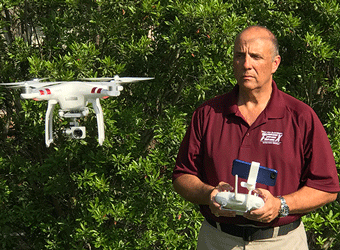TEEX launches training for drone pilots at public safety agencies
 COLLEGE STATION — Public safety personnel who pilot drones in the airspace are the target audience for a new course launched by the Texas A&M Engineering Extension Service (TEEX). “Introduction to sUAS — Public Safety” is aimed at pilots of small Unmanned Aircraft Systems (sUAS) used in emergency response and disaster reconnaissance and recovery. The first session will be offered May 22-24, 2018, at the RELLIS Campus in Bryan.
COLLEGE STATION — Public safety personnel who pilot drones in the airspace are the target audience for a new course launched by the Texas A&M Engineering Extension Service (TEEX). “Introduction to sUAS — Public Safety” is aimed at pilots of small Unmanned Aircraft Systems (sUAS) used in emergency response and disaster reconnaissance and recovery. The first session will be offered May 22-24, 2018, at the RELLIS Campus in Bryan.Drones give first responders a bird’s eye view of a crime scene or disaster event without the high cost of operating a helicopter, said Training Manager Kyle McNew with TEEX Law Enforcement and Security Training. “We’ve already seen the importance of using drones for 3D mapping of crime scenes and traffic crash reconstruction, as well as search and rescue and aerial reconnaissance in disaster recovery, such as Hurricane Harvey.”
The three-day, hands-on course will provide remote flight training to prepare sUAS pilots to take the FAA Part 107 exam, said McNew, who holds his pilot’s license, and will teach the course, along with co-instructor Michael Clark. The course is designed to meet the specific needs of police officers, firefighters, search and rescue, and emergency management personnel starting a sUAS program, he added. Both McNew and Clark completed a train-the-trainer course with SkyOp LLC in Canandaigua, NY, and will be using the nationally recognized SkyOp curriculum in the Texas course. (In photo, Kyle McNew flies a quadcopter.)
“I became interested in drones and began exploring the public safety opportunities, but did not find many training programs in Texas to address public safety concerns,” McNew says. “The use of sUAS has the potential to extend a public safety agency’s capabilities, help emergency managers make informed decisions and improve the safety of everyone involved.
“Course participants will learn about the airspace and Part 107 rules and regulations and how to read navigation charts. They will learn multiple ways to fly a drone, and gain experience in flight training using a simulator and a training quadcopter.”
Topics also include flying multirotor and fixed-wing sUAS, maintenance, FAA policies, registration process, commercial applications, featured systems (DJI, Yuneec) and emerging technologies. Each participant leaves the class with a training quadcopter and simulation software.
TEEX also offers the National Unmanned Aircraft Systems Credentialing Program in collaboration with the Lone Star UAS Center of Excellence and Innovation, State of Texas FAA UAS Test Site, at Texas A&M University — Corpus Christi. Commercial Operators holding a Part 107 or Section 333 exemption can earn the credential following a 3rd party vetting that includes an extensive review of the company’s operations and safety policies, procedures and qualifications as well as an oral and live-flight audit.
Because of the increased demand for hands-on training in piloting sUAS, McNew said TEEX has further expanded its training to include Introduction to sUAS (for civilian pilots) and Remote Pilot Knowledge Test Prep (for commercial drone pilots).
To learn more, visit the webpage on Small Unmanned Aircraft Systems (sUAS) Drones.
